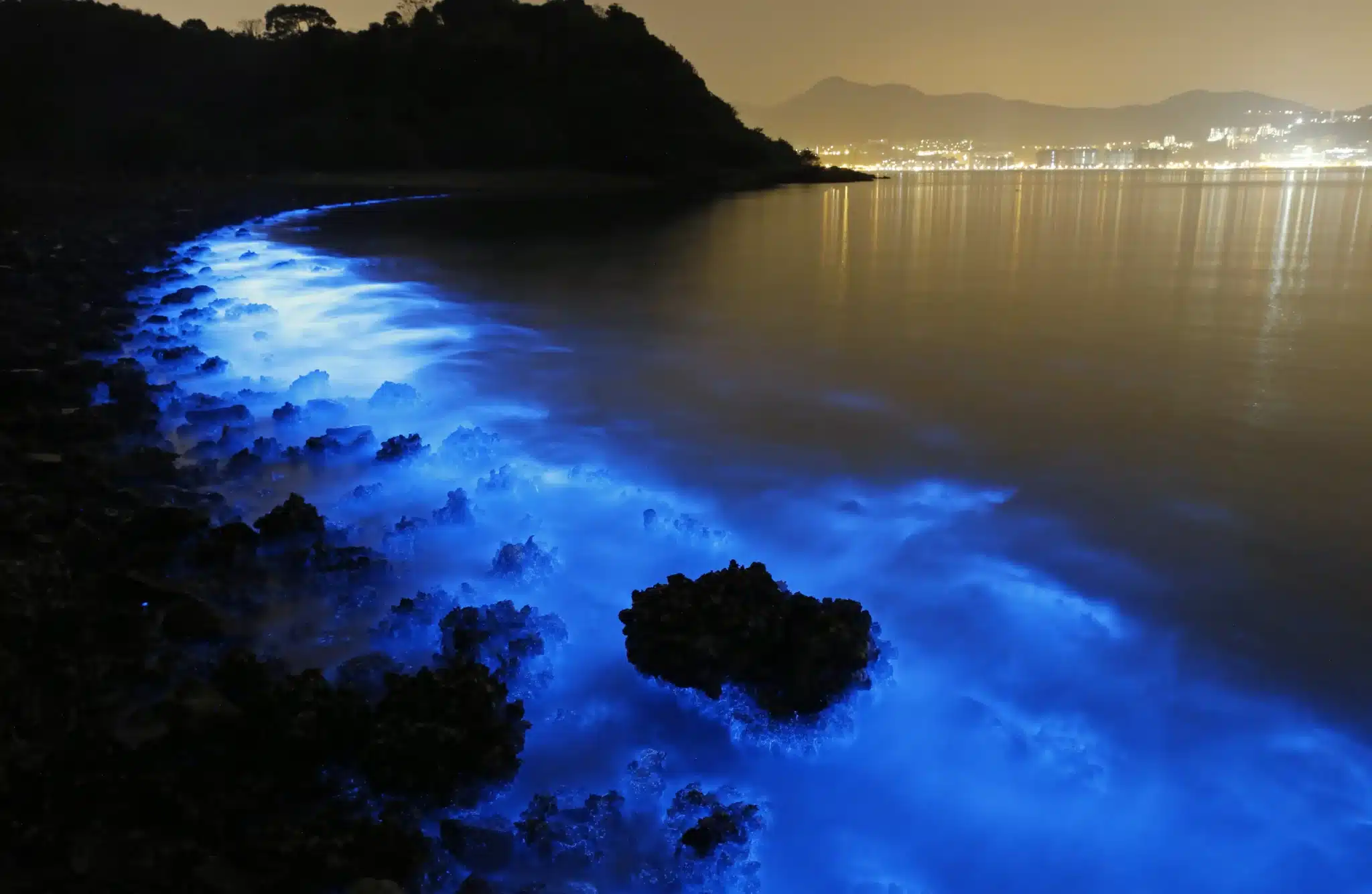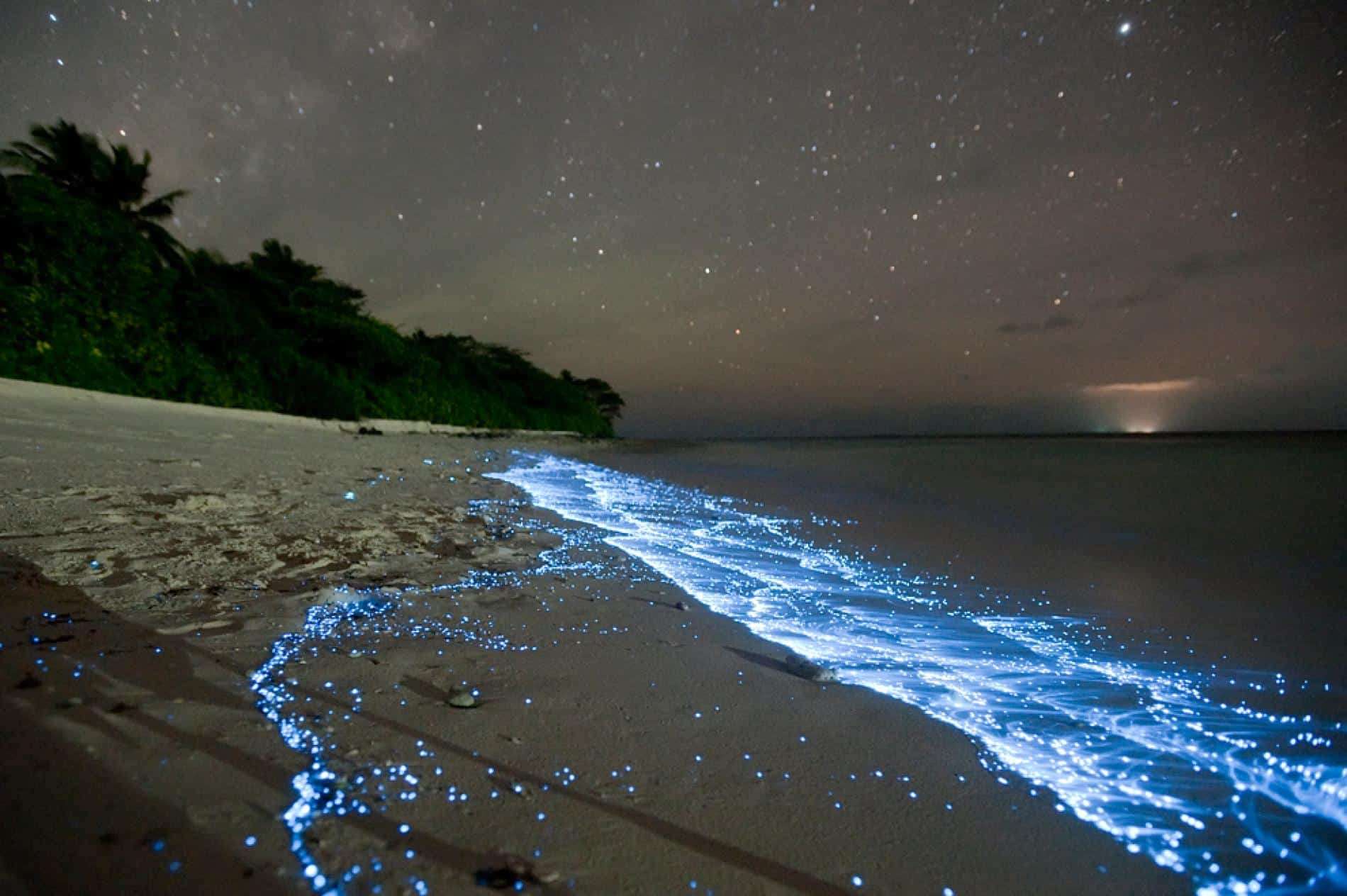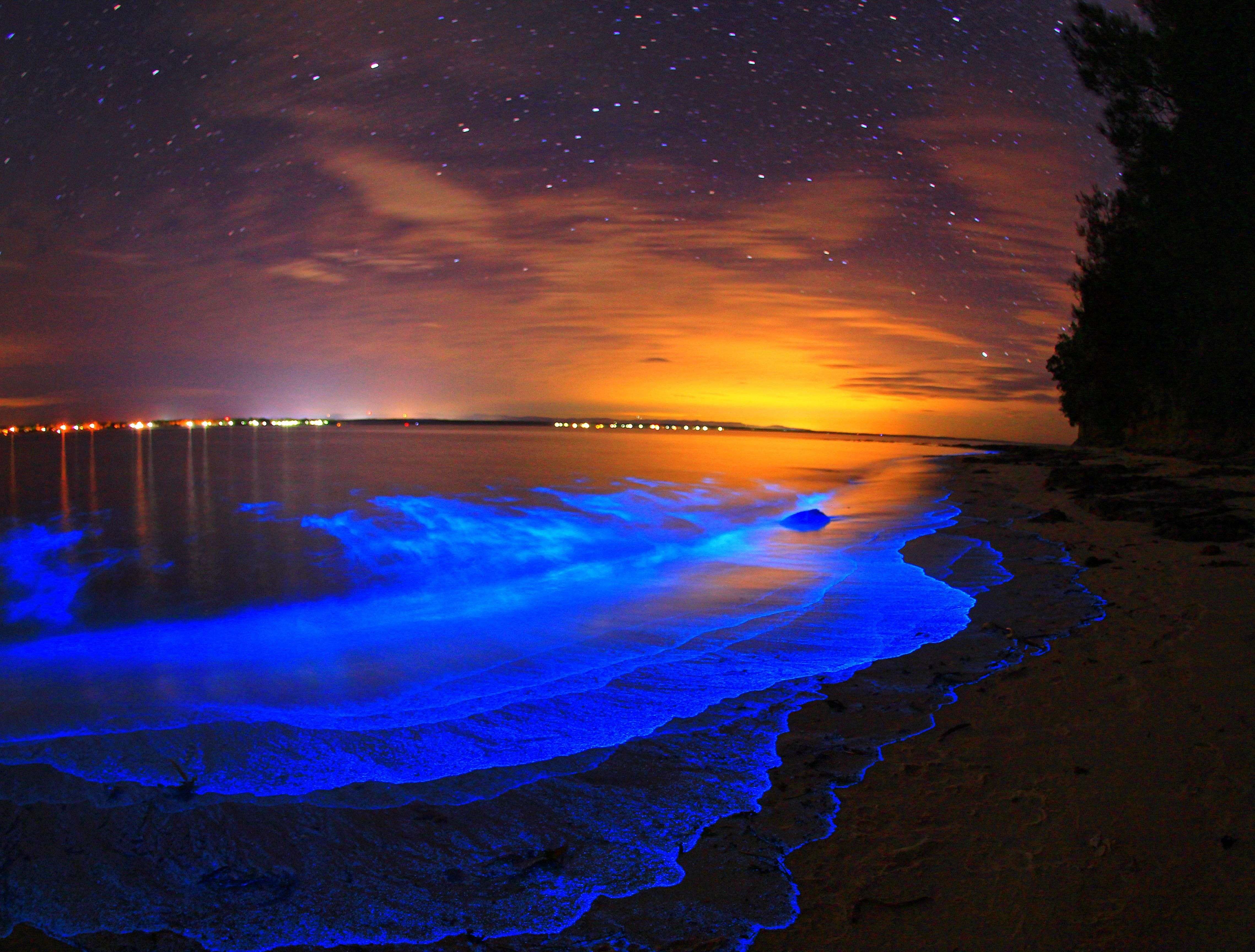Discovering the Enchanting Bioluminescent Beach

Introduction
Where Is The Bioluminescent Beach? Have you ever dreamed of walking on a beach that glows in the dark? A beach where the waves shimmer with a mesmerizing blue light, creating a magical and ethereal atmosphere? If so, then you must be wondering, where is the bioluminescent beach?
Bioluminescence is a natural phenomenon that occurs when certain organisms, such as plankton or algae, emit light. This phenomenon can be observed in various parts of the world, but there are a few places that are particularly famous for their bioluminescent beaches.

Where is bioluminescence beach located?
Mosquito Bay, Puerto Rico. Hidden on the southern coast of Vieques, off the east coast of mainland Puerto Rico, this narrow inlet widens into a dolphin-shaped bay of mangroves that protects the brightest occurrence of bioluminescence in the world according to Guinness World Records.
Bioluminescence beach is a natural phenomenon that occurs in certain coastal areas around the world. It is a mesmerizing display of glowing blue lights in the water, caused by the presence of bioluminescent organisms. These organisms, such as dinoflagellates and plankton, emit light through a chemical reaction called bioluminescence. One of the most famous bioluminescence beaches in the world is located in the Maldives.
The Maldives is an archipelago of islands in the Indian Ocean, known for its stunning beaches and crystal-clear waters. The bioluminescence beach in the Maldives is located on Vaadhoo Island, which is part of the Raa Atoll. This small island is home to a unique natural phenomenon that attracts tourists from all over the world.
The bioluminescence beach on Vaadhoo Island is particularly famous for its glowing blue waves. When the waves crash onto the shore, they create a stunning display of sparkling lights, as if the entire beach is illuminated. This phenomenon is best observed at night, when the darkness enhances the visibility of the bioluminescent organisms.
Visitors to the Maldives’ bioluminescence beach may wander along the beachfront and watch their footsteps leave a blue light trail. This amazing experience is commonly called walking on stars. Tourists also board boats to see the bioluminescence from a different angle, as the water around the island lights up with every movement.
Where is the beach that glows at night?
You can witness the bioluminescent waves at Hermosa Beach in California, where microscopic phytoplankton called Lingulodinium polyhedra generate blue light using luciferin, a light-emitting molecule. The ocean gets a magical glow at night due to the phytoplankton.
The Maldives’ nighttime beach shines. This lovely beach, Vaadhoo Island, is known for its bioluminescent phytoplankton that illuminate the shoreline at night. Bioluminescence occurs when water movement disturbs phytoplankton, causing the light effect.
Vaadhoo Island is part of the Raa Atoll in the Maldives, a tropical paradise in the Indian Ocean. The Maldives is an archipelago consisting of 26 coral atolls, which are made up of hundreds of islands. The country is renowned for its pristine white sandy beaches, crystal-clear turquoise waters, and abundant marine life.
The beach on Vaadhoo Island is particularly special because of the mesmerizing glow that illuminates the shoreline at night. The bioluminescent phytoplankton emit a blue glow, creating a magical and otherworldly atmosphere. This phenomenon has made Vaadhoo Island a popular tourist destination, attracting visitors from around the world.
To witness the beach glowing at night, visitors can take a boat ride to Vaadhoo Island and explore the shoreline after sunset. As the waves crash onto the beach, the phytoplankton light up, creating a breathtaking spectacle. The glowing effect is most visible on moonless nights when the sky is dark, allowing the bioluminescence to shine brightly.
Visitors to Vaadhoo Island can also enjoy other activities during the day, such as snorkeling, diving, and sunbathing on the beautiful sandy beaches. The Maldives is known for its vibrant coral reefs, which are home to a diverse range of marine species. Snorkeling and diving enthusiasts can explore these underwater ecosystems and encounter colorful fish, turtles, and even dolphins.
Where is the beach that glows blue?
The sand on this beach glows in the dark because of ostracod crustaceans, or sea shrimp. These tiny organisms, only one millimeter in length, emit the blue light for up to a minute, lighting up your path as you walk across the beach.
The beach that glows blue is located in the Maldives, specifically on Vaadhoo Island. This natural phenomenon, known as bioluminescence, occurs when certain marine organisms called phytoplankton emit a blue glow in response to movement or disturbance in the water. The beach on Vaadhoo Island is famous for its stunning display of bioluminescence, attracting tourists from all over the world.
Vaadhoo Island is part of the Raa Atoll in the Maldives, a tropical paradise known for its pristine beaches, crystal-clear waters, and vibrant marine life. The island itself is relatively small, with a population of around 500 people. It is a popular destination for tourists looking to experience the unique beauty of the bioluminescent beach.
The glowing beach on Vaadhoo Island is a result of a natural chemical reaction that occurs when the phytoplankton are disturbed. These tiny organisms contain a pigment called luciferin, which reacts with oxygen to produce light. When waves crash onto the shore or when people walk through the water, the movement causes the phytoplankton to emit a mesmerizing blue glow.
The bioluminescent beach on Vaadhoo Island is particularly stunning at night when the darkness enhances the visibility of the glowing organisms. Visitors can witness the magical sight of the beach shimmering with blue light, creating an otherworldly atmosphere. It is truly a sight to behold and has become a popular attraction for photographers and nature enthusiasts alike.
Are there any bioluminescent beaches in the US?
Torrey Pines Beach, California / Mission Bay, San Diego
Some of the most impressive bioluminescence sights in the country can be found on a San Diego sea night beach at night.
Yes, there are bioluminescent beaches in the US. Bioluminescence is a natural phenomenon where living organisms produce light. It is commonly seen in marine environments, particularly in coastal areas. The light is produced by tiny organisms called dinoflagellates, which are single-celled algae that emit light when they are disturbed. These dinoflagellates are responsible for the mesmerizing glow that can be seen on certain beaches in the US.
One of the most famous bioluminescent beaches in the US is Mosquito Bay in Puerto Rico. It is often referred to as the “”Bioluminescent Bay”” due to its incredible display of bioluminescence. The bay is home to a high concentration of dinoflagellates, which create a stunning blue glow in the water when they are disturbed. Visitors can take guided kayak tours to experience this magical phenomenon up close.
Another bioluminescent beach in the US is Tomales Bay in California. This bay is known for its bioluminescent plankton, which create a beautiful display of blue-green light in the water. Visitors can rent kayaks or paddleboards to explore the bay and witness the bioluminescence firsthand. It is truly a unique and unforgettable experience.
There are also several other beaches along the coast of Florida that experience bioluminescence. For example, the Indian River Lagoon on the east coast of Florida is known for its bioluminescent comb jellies, which emit a greenish-blue light. Visitors can take boat tours or kayak through the lagoon to witness this natural light show.
Is it safe to swim in bioluminescent water?
Things like bioluminescent algae that twinkle along the seascape can poison sea life from fish to sea turtles and can make humans very sick if they come into contact with it, so swimming is not advised.
Bioluminescent water, also known as glowing water, is a natural phenomenon that occurs when certain organisms, such as plankton or bacteria, emit light. This mesmerizing display of glowing blue or green water can be found in various parts of the world, including Puerto Rico, the Maldives, and Jamaica. While swimming in bioluminescent water may seem like a magical experience, many people wonder if it is safe to do so.
The safety of swimming in bioluminescent water depends on several factors.
Firstly, it is important to consider the location and the specific organisms responsible for the bioluminescence. In most cases, the organisms that cause bioluminescence are harmless and do not pose any threat to humans. However, there are some instances where certain species of bioluminescent organisms can be toxic or cause skin irritation. It is crucial to research the specific location and consult local authorities or experts to ensure the safety of swimming in bioluminescent water.
Secondly, the water conditions and surrounding environment should be taken into account. Bioluminescent water is often found in natural bodies of water, such as lagoons or bays. It is important to assess the water quality and any potential risks associated with swimming in these areas. Factors such as pollution, algae blooms, or other environmental hazards can affect the safety of swimming in bioluminescent water. It is advisable to check for any advisories or warnings before entering the water.

Can you provide directions to the bioluminescent beach?
Yes, I can provide directions to the bioluminescent beach. The bioluminescent beach is located on the east coast of the island, about 10 miles south of the main town. To get there, you can start by heading south on the main road until you reach the coastal highway. Take a left onto the coastal highway and continue driving for about 5 miles until you see a sign for the bioluminescent beach. Take a right at the sign and follow the road for another 2 miles until you reach the parking area.
Once you have parked your car, you will need to walk for about 10 minutes along a well-marked trail that leads to the beach. The trail is relatively easy to navigate and there are signs along the way to guide you. As you walk, you will start to see the glow of the bioluminescent organisms in the water, which will lead you directly to the beach. It is important to note that the beach is only accessible during low tide, so be sure to check the tide schedule before planning your visit.
What is the exact location of the bioluminescent beach?
The exact location of the bioluminescent beach is in [insert location]. This beach is known for its stunning natural phenomenon where the water glows in the dark due to the presence of bioluminescent organisms. It is a truly magical sight to behold and attracts visitors from all over the world.
To reach the bioluminescent beach, you can [insert transportation options]. It is important to note that [insert any specific instructions or guidelines]. The beach is [insert distance] from [insert nearest city or landmark].
When trying to find the bioluminescent beach, keep an eye out for [insert landmarks or signs]. These can help guide you in the right direction and ensure that you don’t miss out on this incredible experience. It is recommended to visit the beach at night when the bioluminescence is most visible. Remember to bring a camera to capture this unique natural phenomenon!
How can I reach the bioluminescent beach?
To reach the bioluminescent beach, there are a few different options depending on your starting point. If you are coming from the nearby town, the easiest way to reach the beach is by car. Simply follow the main road out of town and look for signs indicating the way to the beach. The drive should take around 30 minutes and there is ample parking available near the beach.
If you are coming from further away or do not have access to a car, there are also public transportation options available. There is a bus that runs from the town to the beach several times a day. You can check the bus schedule online or at the local bus station to plan your trip. The bus ride takes approximately 45 minutes and drops you off within walking distance of the beach.
Is the bioluminescent beach easily accessible?
Yes, the bioluminescent beach is easily accessible for visitors. Located just a short distance from the main road, it is easy to find and reach. The beach is well-known and popular among tourists, so there are clear signs and directions along the way to guide you. Whether you are driving or taking public transportation, you will have no trouble reaching the beach.
Once you arrive at the beach, there are designated parking areas available for visitors. From there, it is a short walk to the beach itself. The path is well-maintained and easy to navigate, making it accessible for people of all ages and physical abilities. Whether you are visiting during the day or at night, you will have no trouble reaching the bioluminescent beach and experiencing its natural beauty.
Are there any landmarks or signs to look out for when trying to find the bioluminescent beach?
Yes, there are several landmarks and signs that can help you find the bioluminescent beach. One important landmark to look out for is the large rock formation known as “”Glowing Rock.”” This rock formation is located near the entrance of the beach and is easily recognizable due to its unique shape and vibrant colors. Another landmark to keep an eye out for is the “”Bioluminescent Beach”” sign. This sign is placed along the main road leading to the beach and is clearly visible from a distance. It serves as a helpful indicator that you are on the right track.
In addition to these landmarks, there are also smaller signs along the path that lead to the beach. These signs provide directions and information about the bioluminescent beach, ensuring that you stay on the correct path. It is important to pay attention to these signs and follow their instructions to avoid getting lost. Overall, the presence of these landmarks and signs makes it relatively easy to find the bioluminescent beach and enhances the overall experience of visiting this unique natural wonder.
Conclusion
The bioluminescent beach is a natural wonder that has captivated the imagination of people around the world. This unique phenomenon occurs when certain organisms in the water emit a glowing light, creating a mesmerizing display that is truly breathtaking to witness. Many people are curious about where they can find a bioluminescent beach and experience this magical sight for themselves.
One of the most famous bioluminescent beaches in the world is located in the Maldives. The beach on Vaadhoo Island is known for its stunning display of bioluminescence, with the water glowing a vibrant blue at night. This natural phenomenon is caused by a type of plankton called dinoflagellates, which emit light when they are disturbed. Visitors to Vaadhoo Island can take a nighttime stroll along the beach and watch as their footsteps light up the water, creating a truly unforgettable experience.
Another popular destination for bioluminescent beaches is Puerto Rico. Mosquito Bay, located on the island of Vieques, is often referred to as the brightest bioluminescent bay in the world. The bay is home to millions of dinoflagellates, which create a stunning display of blue-green light when the water is disturbed. Visitors can take a guided kayak tour of the bay and witness the magical glow of the water firsthand.
While the Maldives and Puerto Rico are well-known for their bioluminescent beaches, there are many other locations around the world where this phenomenon can be observed. From the shores of California to the beaches of Thailand, bioluminescent beaches can be found in various parts of the globe. Whether you are a nature enthusiast or simply looking for a unique and unforgettable experience, visiting a bioluminescent beach is sure to leave you in awe of the beauty and wonder of the natural world.



